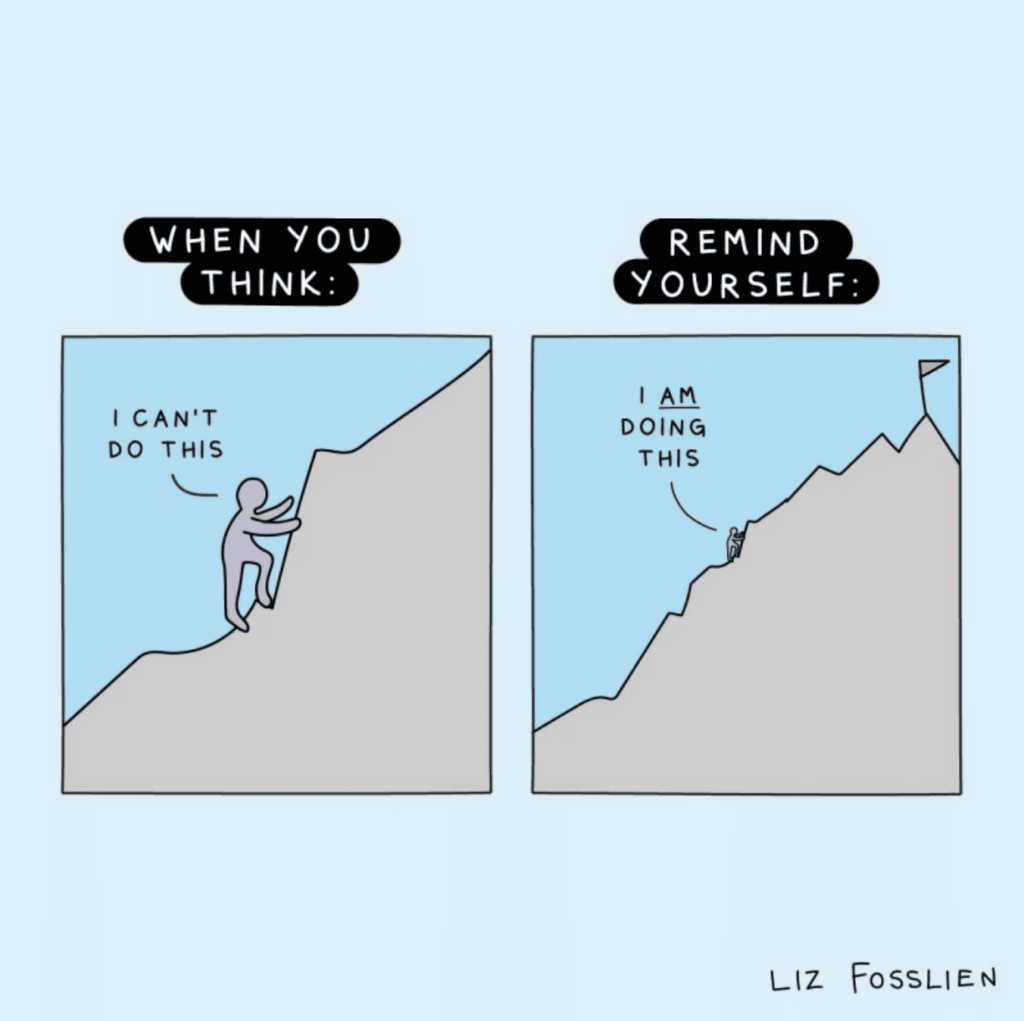Table of Contents
And just like that, the holidays are a distant memory.
The Christmas tree *should* be packed away. Stores are all open and it’s business as usual at the office. If you’re at college, the semester is in full swing again.
Suddenly, those New Year’s resolutions that you so diligently set feel a lot less important—and a lot more challenging to keep.
You may find that there are more gaps between days in the daily journal you so eagerly purchased.
Maybe you missed a day at the gym, or two.
Perhaps you’ve hit snooze on the alarm instead of waking up at 6 a.m. and seizing the day. Or you vowed to eat healthier, then started to lean back on old favorites once life got busier, Liz Lemon style.
Whatever it is, I get it. And I’m here to tell you that you are not alone.
In fact, eight in 10 people miss the mark on their New Year’s Resolutions.
So if you’ve veered off course, you’re actually in the majority.
Almost all of us will experience setting a New Year’s Resolution and letting it slip at some point in our lives. When that happens, you’ll probably feel guilty and start telling yourself “I’m a failure” OR you might go the opposite direction and say “well, if I didn’t achieve it, I may as well just go all out” (guilty as charged 🤦).
But the truth is, it’s how you respond after breaking a resolution that really counts.
That’s when you have the choice to reflect, learn, change gears, or switch course.
So if you missed the mark on a New Year’s resolution, don’t worry. You didn’t fail—in fact, far from it. Below, I’m going to show you exactly why you shouldn’t take this setback to heart AND provide you with actionable next steps to own this year, next year, and all of the years after that.
Okay, but why do so many of us break our New Year’s resolutions?
So many reasons.
The most likely culprit, however, is probably the fact that we tend to go all out with our goals and get a little too enthusiastic along the way.
You know what I’m talking about. It’s like:
- Going from meditating 0 times a week to seven days a week.
- Switching from waking up at 8AM to waking up at 6AM.
- Hitting the gym once a week to training five times a week and vowing to eat healthy every single day.
Notice how all of these goals are miles away from the starting point?
These are habits that take months to cultivate, if not years—and they’re such a change from your current state of being that it’s a massive shock to the system.
Here’s another way to think about it.
When you put your foot on the pedal of the accelerator, it doesn’t go from 0 to 60 instantaneously.
It needs to rev up before it gets to the speed you want.
Sure, cars do this in a matter of seconds. But the principle stands: you can’t switch from one state to the other straight away. You need to climb to 10, 20, or 30, and any other expectation is just setting yourself up to fall short.
Another reason we slip?
Three words: expectation vs. reality.
I’m INSANELY guilty of this. Every now and then, I watch Rocky and get incredibly motivated by the training montages. I think to myself “man, I can do that too! I can put in the hard work, hustle, and grind. I’m going to do it starting tomorrow.”
When I get out there and run though, I suddenly realize that it’s not really that cool.
It actually kind of sucks.
My expectation of what the experience will be like is realms away from reality, and I ditch the resolution altogether.
Finally, there’s the word itself: resolution. The very act of resolution suggests that there’s something broken that needs to be fixed, which is a pretty negative standpoint if you think about it.
The bottom line is: if you miss the mark on a New Year’s resolution, it’s not you. The whole concept is flawed. However, this is an opportunity to take a different approach this year and resolve to ditch the resolutions—once and for all.
What to do if you miss the mark on your resolution
1. First, remind yourself that it’s okay
This whole process of feeling guilty or viewing it as ‘failing’ is toxic, and it needs to go.
You may have tripped up, but that doesn’t mean everything is over from this point onwards. There are plenty of chances for do-overs and to get it right in the future—your year isn’t a disaster and you aren’t a bad person for not achieving exactly what you wanted or not doing something 100% of the time.
2. Flip the script and focus on what you did achieve
So you fell off the bandwagon. But I’ll bet that before that happened, you actually DID make progress.
Too often, we get caught up focusing on the negatives and forget about all the achievements that we made along the way.

Reflect back on your year so far. What did you do right? How many times did you manage to hit your goal, whether that’s eating healthy, exercising for multiple days in a row, saving more from your paycheck, or ordering less from Uber Eats?
When you focus on the good stuff, you’ll be more likely to see any slip-ups as bumps along the road, rather than roadblocks or reasons to quit.
3. Re-evaluate the goal
One possible reason that your New Year’s resolution didn’t stick might be that you weren’t going in the right direction to begin with.
Too often, people feel compelled to set resolutions at the beginning of the year—so they pick something that they’ve always wanted to do, rather than thinking deliberately and planning to achieve a goal.
Trust me: that’s a recipe for disaster, simply because when it gets tough, it’s going to be much tougher to stay the course than with something you really want to achieve.
4. Switch gears

If you’re still intent that you want to achieve your resolution, it’s time to take a good hard look at the path that you’re on to reach that target.
Maybe you’ve set the bar too high to start with, or there’s a better approach for your current lifestyle and situation.
For example, if you said you wanted to save 10% of your paycheck every week but you’ve saved zero so far, try reframing it to saving 10% every month or breaking it down into smaller, more manageable amounts.
You’ll still be on the road to your end goal, but you’re just taking a different route to get there.
Alternatives for the year ahead
Set a word of the year instead

A few years ago, I was struggling with two conflicting ideas: I wanted to set goals for the year, but I literally had a list of 10 things I wanted to achieve. I knew that setting 10 goals would make it difficult to focus on one, so after reading up on New Year’s resolutions, I decided to abandon the traditional route and choose a word of the year instead.
Having a word of the year means that you can apply it to many different situations, while still staying focused on achieving an overarching goal. For example, you might choose the word ‘thrifty’ to spend smarter and save money, or you might choose “relax” if you’re wanting to take more time for yourself and to prioritize your well-being.
Some of my favorite words include:
- Focus, for when you have something significant that you want to do, or you’re struggling with procrastination or distraction.
- Empathy, if you’re trying to build stronger relationships with loved ones or make new friends.
- Why not? for those years when you want to jump all in, switch up the routine, and do something different.
- Grace, when you want to be kinder to yourself and to others.
Set mini-goals along the way

Twelve months is a LONG time, which is why it’s important to have smaller milestones to motivate you as the year goes on.
I’m a huge fan of breaking down big goals into bite-sized pieces and the power that the little things have to make a big difference. For that reason, I’d urge you to experiment with giving yourself checkpoints and progress markers on the path to achieving your goal—and to celebrate them just like you would the final outcome.
Here are three ways to do this:
- Slowly but surely. This might work if your goal is to, say, wake up two hours earlier. You might choose to break this down into smaller steps, such as waking up 15 minutes earlier in January, then an extra 15 minutes earlier in February, and so on. By the end of the year, you’ll be surprised at how far you’ve come.
- Celebrate consistency. If you’re working on a goal where you want to change your lifestyle, it’s important to acknowledge the stretches of time when you do achieve it—no matter how short. Want to journal more? Celebrate every time you journal for one week in a row. This way, you’ll put the focus on the times you did well, instead of the times when you fell short.
- Schedule regular check-ins. Put a reminder in your calendar at regular intervals (such as every week or fortnight) and use this to conduct a pulse check on yourself and how you’re feeling. Think back to what you achieved and whether there’s anything you need to change. Having these regular check-ins will keep you accountable while giving you the opportunity to adjust your approach throughout the year.
Focus on the process, rather than outcome

My personal favorite for this year is to focus on how I’m going to achieve a goal, rather than the actual goal itself.
Let’s say you want to lose 10 lbs this year. Instead of fixating on the amount you want to lose, you focus on the actions that will enable you to reach that final milestone. Things like eating at home five nights a week, replacing your favorite soda with sparkling water, or trying to exercise three times a week.
By focusing on the how rather than the what, you’ll find it much easier to stick to your goals—and achieving your goal becomes an outcome of that process, not the other way around.
There’s still time to make this your year
It doesn’t matter whether it’s January, July, or November—there’s always time to take this year by the reigns and make it your own. You can set goals any time you want, and it’s never too late to start working towards what you want to achieve, no matter how big or small. Trust me—in 12 months, you’ll wish that you had started today.



